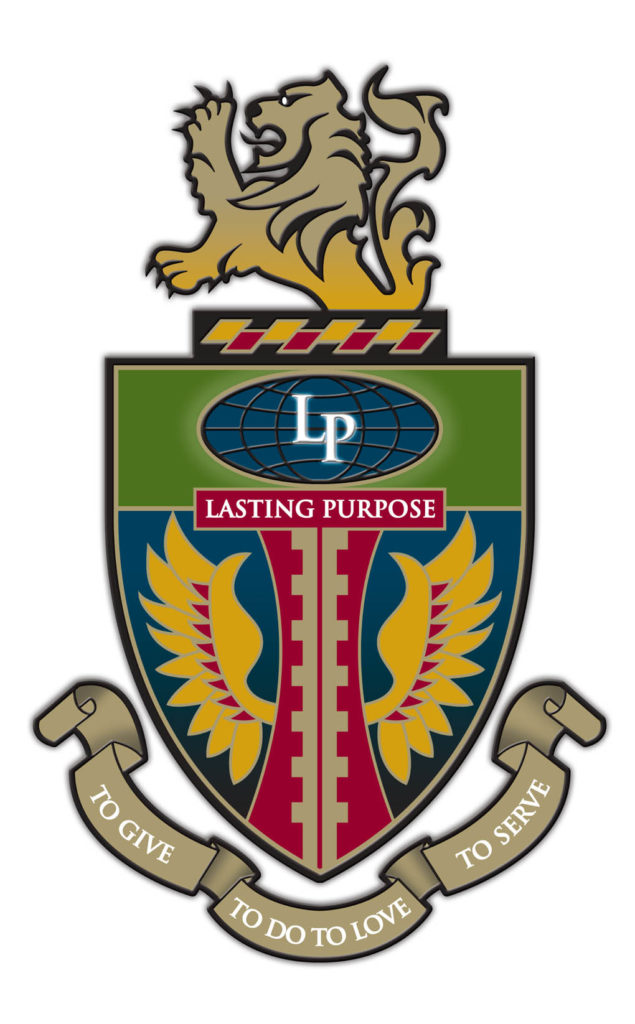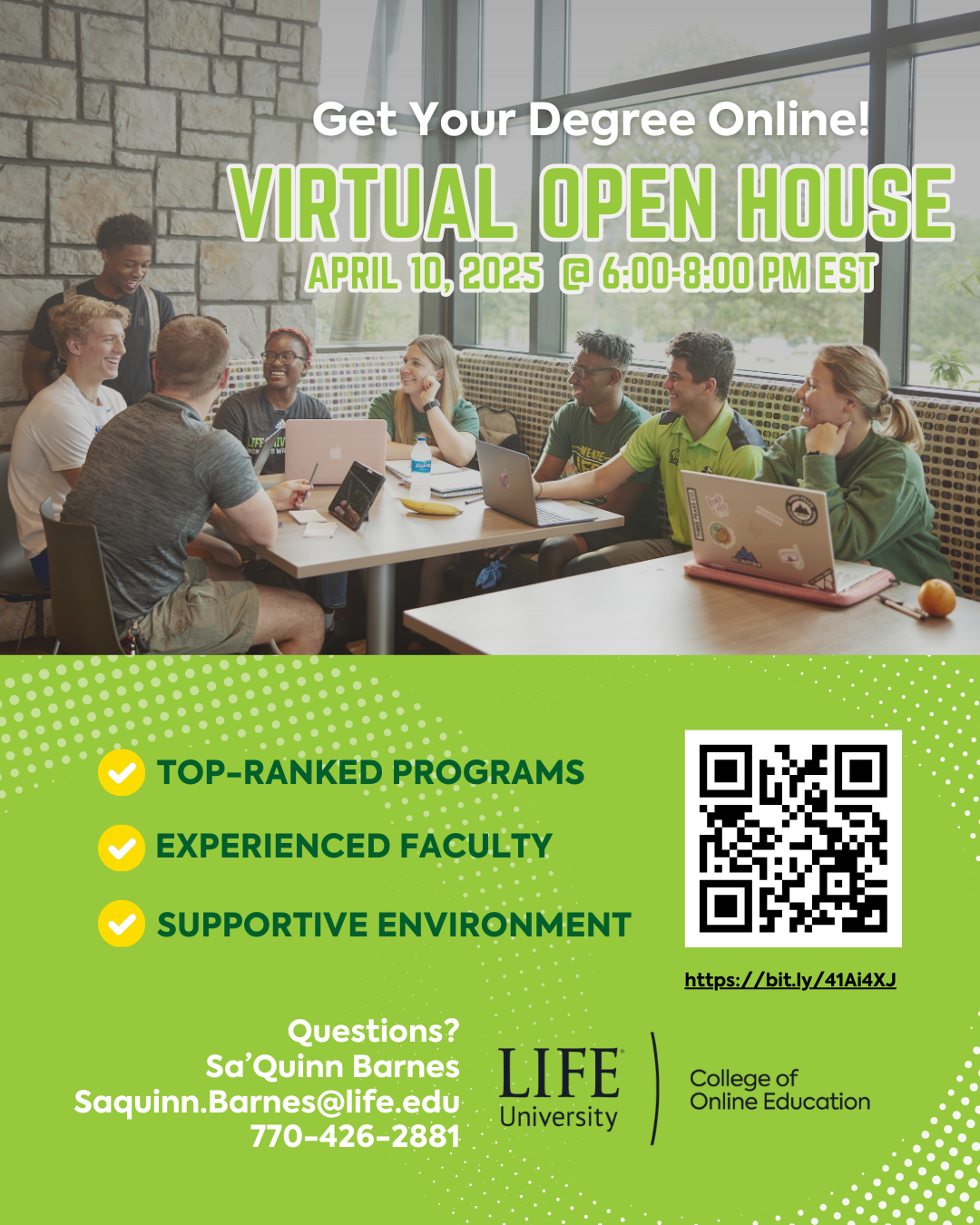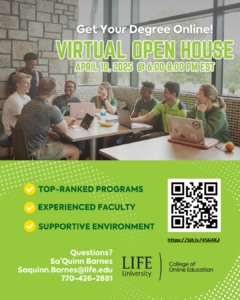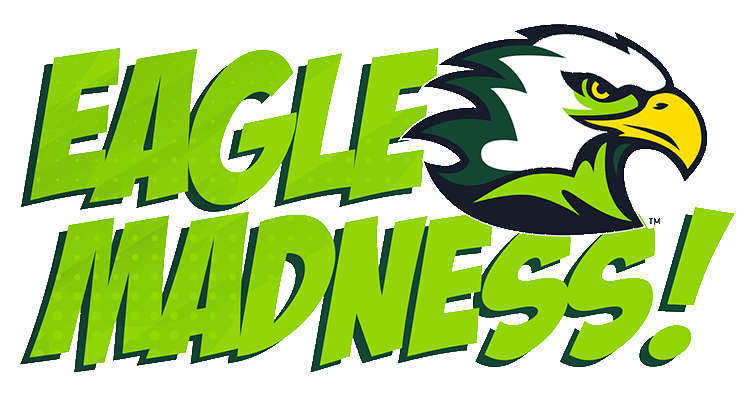About Pages
Open GalleryFaces of LIFE – Student Ambassadors
Why I Chose LIFE, Student Ambassadors
Living Life at Life U Podcast, Student Ambassadors
My 1st Quarter, Student Ambassadors
Sherybel Berrios-Ramos

What has been your most memorable quarter at Life U? My experience in Life University has been nothing short of amazing. There are a lot of things that I cherish from all my time here on campus…
Christian M. Figueroa Hidalgo

10th quarter DC student from San Juan, Puerto Rico. What has been your most memorable quarter at Life U? My most memorable quarter has been 10th quarter. I started serving at the Outpatient…
Sarai Camacho
Cortney Blake

I honestly never got to see Life University campus before I came here. It was a really quick turnaround for me. I was wanting to go to medical school originally but then when Covid19 hit,
Menika Brady

What we are meant to do is always going to be so much bigger than us, so stay focused on that bigger picture. It’s less about myself and more about how I can serve others. When we do that, the…
Faces of LIFE, Student Ambassadors

Dr. Véronica Andrea Garcia Chaparro graduated with a bachelor’s degree from Life University (Life U) in the 2018 Spring Quarter and graduated from the Life U Doctor of Chiropractic Program in the 2019 Winter Quarter…

M.S in Positive Psychology – Coaching Psychology track graduate D.C. student. “The Problem Solver” Prior to attending Life University (Life U), Catherine Clement owned and operated Stabilize…

If you were to put a pin in a map that shows where all the students enrolled in Life U are from, the pins would dot all over as a colorful testament to our diverse campus culture. Many of those…

First Responder Turned Chiropractor and Lifelong Public Servant
D.C. student and Student Ambassador
Hands-on learning and a public servant mindset come naturally to Kyle Padilla. Padilla is a Doctor of Chiropractic student and Student Ambassador at Life University.

Family is very important to Life University alumna Dr. Nicole McCarty. In addition to raising her toddler daughter, Dr. McCarty is a caregiver to her grandparents and her mother, who is in…

“When I came to LIFE Leadership Weekend, the Student Ambassadors were a key thing for my decision to come here because seeing all of their stories and struggles, them still finding a way to be…

“I see my son who constantly talks about being under chiropractic care. I mean this 7-year-old understands some of the chiropractic principles,” she shared. “So, the ripple effect from what my…

Kjell Paris is a 12th quarter Doctor of Chiropractic Student at Life University. He is from Braunschweig, Germany and has a brother who is two and a half years younger who is also in the DC…

For Nick Shelby, becoming a chiropractor is a family affair. Shelby’s father and uncle both graduated from Life University. Regardless of that history, Shelby made the decision to pursue the…

A Mission of “Touch Healers”
Alumni: Doctor of Chiropractic
“Something really cool about Chiropractic is that you can personalize it however you want,” says Life University alumnus Dr. Kevin Kinney. After graduating in 2017, Kinney started a somewhat nontraditional practice since he knew that he did not want to “do the regular office thing.

A Mission of “Touch Healers”
Student: Doctor of Chiropractic Program
From Greenville, South Carolina, Patience Canty is in both the Doctor of Chiropractic and Positive Psychology programs here at Life University.

Showing Up To LIFE
Alumni: Doctor of Chiropractic
Xavier Ortiz Valle arrived in Georgia and Life University just five days after graduating from the University of Puerto Rico with an undergraduate degree in biology – a rather unassuming start, but amazing timing for this eighth quarter chiropractic student from Mayaguez, Puerto Rico.

From Tumult to Triumph: Finding Your Purpose
Alumni: Doctor of Chiropractic
Britni Jordan has come a long way to get to Life University. Jordan is from Jacksonville, Florida, but it’s not the distance that she’s traveled, but the journey that she has taken to get here.

Humble Beginnings
Alumni: Doctor of Chiropractic
“I want everyone to know that no matter how humble your beginnings are, you can do anything you want to.” Graduating later this year with a Doctor of Chiropractic degree, Marleny Espinosa is a prime example of this adage.

Answering The Call to LIFE
Student: Chiropractic
“When people reach out to you for help, you want to help them in the best way possible and give them the best advantages to thrive,” says JaGerran Knight.

Passion and Purpose
Alumni: Dietetics
Now at Life University pursuing a Bachelor of Science degree in Dietetics, Hellen Diaz has come a long distance from her home of Cartagena, Colombia, by way of Fort Lauderdale, Florida. Graduating next quarter, Diaz plans to pursue a dietetics internship here at the University immediately afterward.

Former Student Ambassador,
Doctor
Alumni: Doctor of Chiropractic
As a student ambassador at Life University (LIFE), Brittany McClain has to be ready for anything. Part of her responsibilities include conducting campus tours for prospective students, as well as facilitating graduation. She never knows whom she’ll run into, and her tour groups expect her to set the tone for the day, whether it rains or shines. “Being a student ambassador really helps you to grow in your leadership skills and communicate better with people,” she says. “We never know who we’re going to meet, and we have to be able to relate to them regardless of where they are in life. And we want them to enjoy their time here!”
Getting involved on campus has also been a major factor in McClain’s success and happiness at Life University. She takes advantage of every opportunity to learn, and has enjoyed her two years as a student ambassador, a team she calls “even more close-knit than your classmates.”

In Honor of Family
Alumna: Doctor of Chiropractic
August 2015
Former Student Ambassador
Dr. March-Howard graduated from LIFE in December 2014 and cites being a student ambassador as her most transformative experience while on campus. When she visited LIFE campus during LIFE Leadership Weekend, the student ambassadors made a huge impact on her: “I saw what they were able to do and that they loved what they did, and I saw myself being able to do the same.”

ShaCarolyn Halyard
Living in Integrity
Alumni: Master’s of Science in Positive Psychology – Coaching Track
July 2015
“Dr. Lisa Rubin, my advisor for the Student Ambassadors, saw something in me way before I did,”

Dr. Nico Staples
Who You Really Are
Alumnus: Doctor of Chiropractic, Class of 2014
Past Student Ambassador

Andrés Juliá
Bringing Chiropractic to Puerto Rico
Alumni: Doctor of Chiropractic
June 2015
Former Student AmbassadorRead article.
About Pages
Open GalleryStudent Ambassador Awards
Student Ambassador Awards
| Student Ambassador: Xavier Ortiz Competition: Talk the Tic: Spanish edition Date: April 2018 |
Student Ambassador: Student Ambassadors Competition: Student Leadership Awards Date: May 2018 Award: Student Organization of the Year |
| Student Ambassador: Student Ambassadors Competition: Student Leadership Awards Date: May 2017 Award: Member Development and Education Award |
Student Ambassador: Student Ambassadors Competition: Student Leadership Awards Date: May 2016 Award: Student Organization of the Year |
| Student Ambassador: Student Ambassadors Competition: Student Leadership Awards Date: May 2013 Award: Member Development and Education Award |






